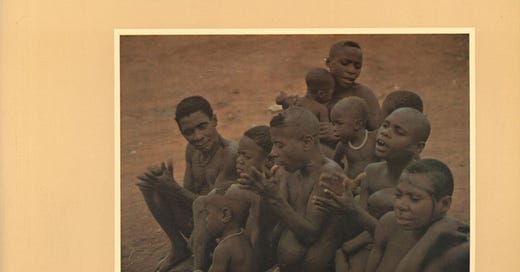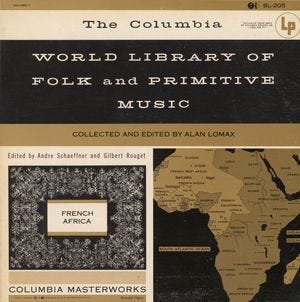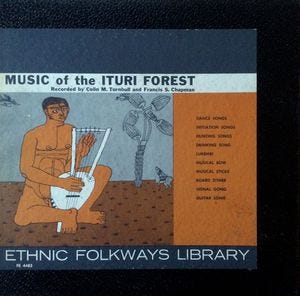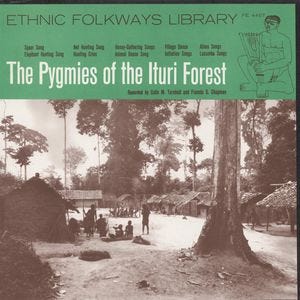Some Jazz Records: Leon Thomas Clippings ("Pygmy" Music Special)
Comments on recordings from musicians and other actors of the jazz scene. Random and not-so-random listening cues from the archives.
African Music from the French Colonies, vol. II of The Columbia World Library of Folk and Primitive Music, Columbia Masterworks SL 205, 1955, LP.
"Right now I’m sort of entranced by the sounds of the Pygmies in the Congo—what has been termed yodeling," singer Leon Thomas told the BBC during the promotion of his 1970 Spirits Known and Unknown album. "I’m trying to extend this into a contemporary sound. You can hear this on that LP Spirits on a song called 'Echoes.' I’ve always had this thing that has been characterized as yodeling. Upon doing research a friend of mine, Lewis Brown, let me hear an album recorded in French West Africa—it set me back on my heels, because they were doing what I was attempting to do, but they were much more proficient." Discussions of this first encounter by Thomas elsewhere indicate that the record he heard was the second volume of the Columbia World Library of Folk and Primitive Music, an historic anthology released in 1955. The last band of this volume, which can be heard at the Internet Archive, features recordings made in 1946. (The first part of an article using Thomas’s BBC interview has been made available online by Jazz Journal.)
The Music of the Ba-Benzélé Pygmies, vol. 3 of UNESCO Collection: An Anthology of African Music, Bärenreiter-Musicaphon BM 30 L 2303, 1966, LP.
"I bought other records," Thomas further told the BBC, "and one thing in particular I liked was a lullaby that a woman was singing—a Pygmy lady outside a hut, and I think she was the swingiest singer in the world! Well, we try to do this, and with other contemporary ideas. The odd thing was I was working on this yodeling thing long before I ever heard or knew of the Pygmies and their music. It must have been buried deep in the subconscious." Thomas elaborated in a 1971 interview with Earth magazine: "I realized the sense of what I was doing and it helped me develop it. In fact, on the UNESCO album where I heard the Pygmies, two women sing lullabies. On one cut the woman keeps tempo. It might be Coltrane on the single track and Coltrane when the two ladies sing together. If you could stretch your imagination a little bit, and put drums and piano behind her, she’d be the swingingest thing in the world." A volume of the extensive UNESCO Collection of Traditional Music is devoted to the Ba-Benzélé Pygmies. Those 1965 recordings can be heard at the Internet Archive (the lullabies discussed by Thomas are tracks 6 and 7).
Music of the Ituri Forest, Folkways FE 4483, 1957, LP; and The Pygmies of the Ituri Forest, Folkways FE 4457, 1958, LP.
Talking to rock magazine Creem in 1970, Leon Thomas discussed the influence of pygmy music on others than himself. "They began to broaden their research and their sources of reference," the singer said of horn players. "They began to listen to themselves for precedents, you know. Find out who they were. And in doing so they came upon the music of the [Ituri] Forest, which is a part of the forest in the Congo, where the Pygmies live. I’m sure they had some of the same albums and I’ve now got the entire series of them. It’s an endless source of material you can draw from. They heard the music of the forest, especially Eric and Trane." During John Coltrane and Eric Dolphy’s time, Folkways issued some of the first documentation of pygmy music on record, two titles made from tapes recorded in the Ituri rainforest by anthropologist Colin Turnbull.








Some amazing music that Leon was digging.
The Folkways and Lomax's Columbia collection are great and very much worth hearing - but omg the Unesco album of the Ba-Benzélé is out of this world.
Extraordinary sounds: - a deep magical wonderful record